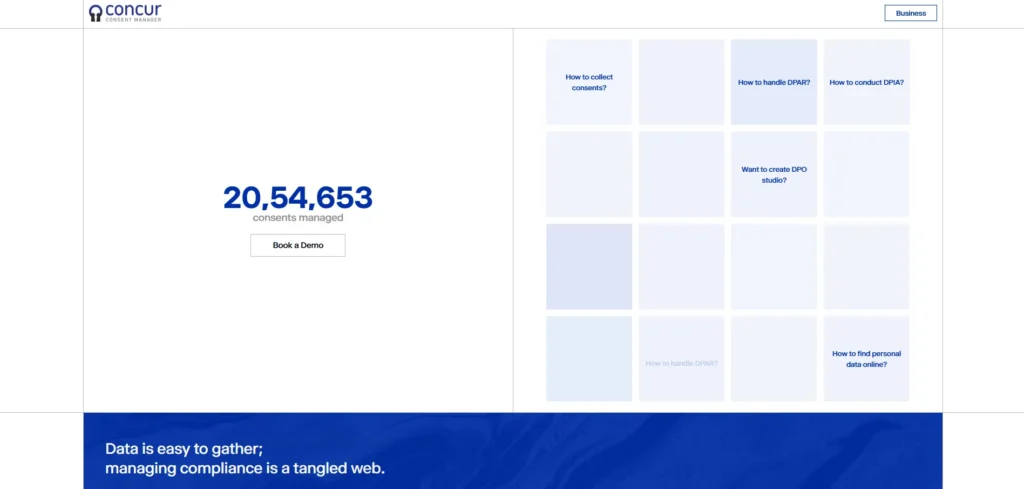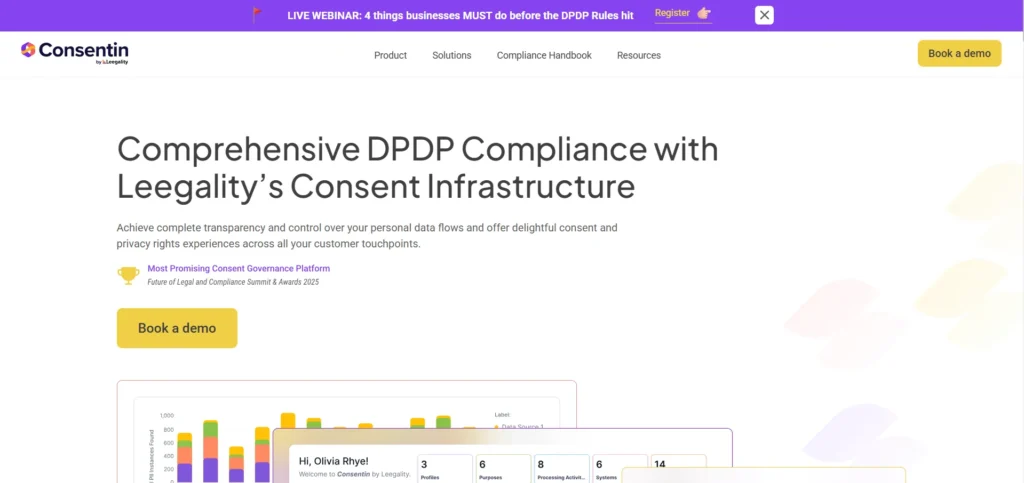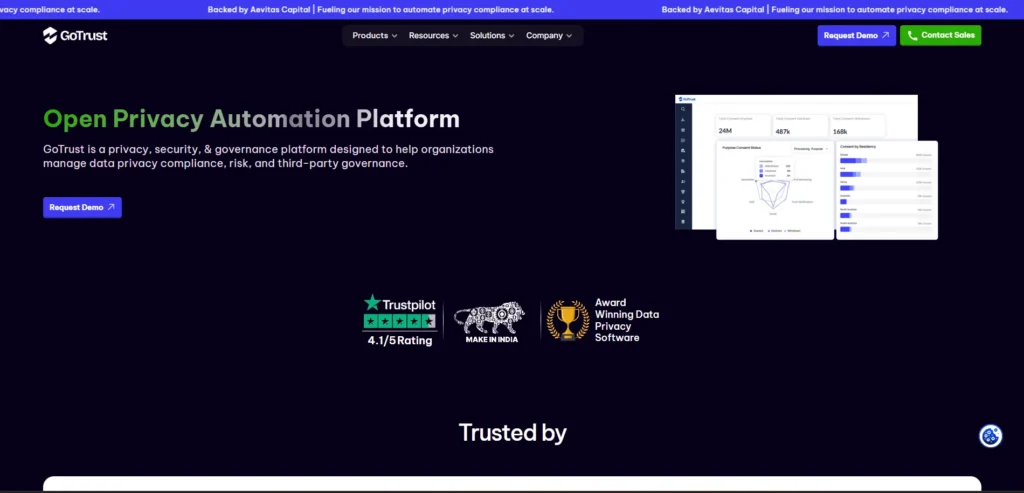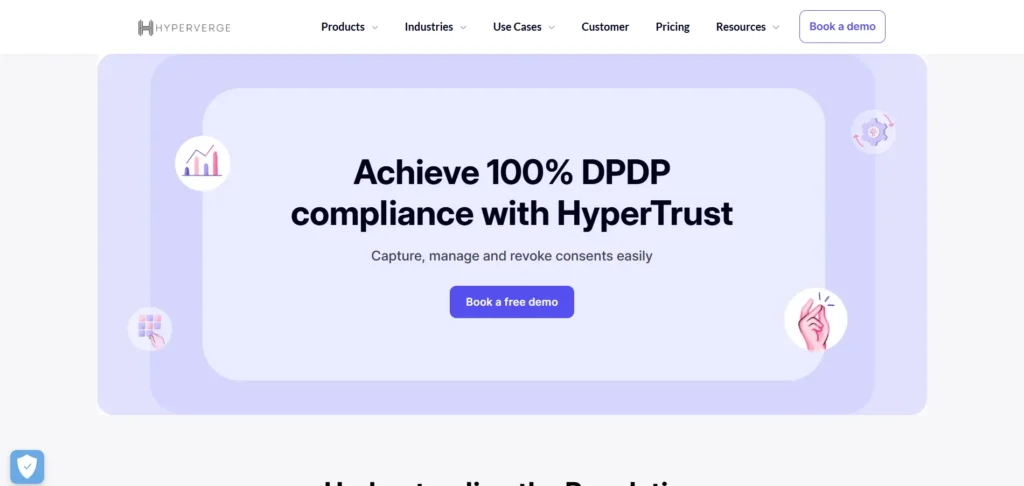Imagine providing your bank with access to your income data, or Aadhaar number, without knowing how they will use it, or the reason they wanted it in the first place. Scary right? That’s precisely why Consent Management for Financial Services is more relevant now than ever.
Customers today are not only expecting to have some control over their personal data, but regulators are, too. With India’s Digital Personal Data Protection Act (DPDPA) in effect, financial institutions need to collect, manage and verify user consent at every phase. If institutions are manually or using outdated systems when granting consent, they face compliance risks, data misuse or losing consumer trust.
Consent Management Platforms (CMPs) are designed for this process. CMPs work with banks, NBFCs, insurers and fintech players to empower responsible user data usage, while maintaining transparency and integrity using appropriate security.
Why Financial Services Need a Consent Management Platform
The financial services sector is responsible for holding some of the most sensitive data there is: identity proofs, account details, credit history, income materials, etc. With no way to manage permissions, financial institutions leave themselves open to huge legal and reputational risks.
Here’s why Consent Management for Financial Services is essential:
- Legal Compliance: Stay aligned with DPDPA, RBI, SEBI, and even global laws like GDPR
- Audit Readiness: Maintain tamper-proof logs and consent histories
- Customer Trust: Offer transparency and easy control to your users
- Operational Efficiency: Reduce manual work and automate consent capture and validation
- Data Governance: Make sure data is accessed and used only when appropriate and permitted
Whether you’re a growing fintech or a large bank, using a CMP can reduce your compliance burden while improving customer experience.
Key Features to Look for in a CMP
Not every Consent Management Platform is the same. Before you settle on a solution, assess if it offers the essential features mentioned below that are specific for financial services:
- Granular Consent Options: The ability for users to consent or withdraw consent for certain services or data types individually.
- Consenting Logs: Timestamped, tamper-proof audits for all user consent actions taken in real time.
- Multi-channel: Works over web, mobile apps, call centers and even physical branches.
- Revocble and Dynamic Consent: Users should have the ability to change or revoke consent at any time.
- Multi-lingual UI: It is particularly relevant to diverse Indian customer bases.
- Data Masking and Controls: Make sure only authorized teams have access to sensitive data, and only when needed.
- Integration capability: Integrate into your existing tech stack – CRM, loan origination or KYC, and analytics tools.
Top Consent Management Tools for Financial Services in India
Here are six top-rated platforms, listed alphabetically, that help financial service providers manage consent efficiently and comply with DPDPA.
1. Concur – Consent Manager

Concur is a homegrown CMP designed specifically for India’s Digital Personal Data Protection Act (DPDPA). It also offers deep regulatory alignment by offering multilingual consent notices (22 official languages), real-time consent orchestration, an automated audit trail delivered via dashboards, and more. With API-first SDKs and plug‑in integration for web, mobile, and enterprise systems, it handles structured and unstructured data alike. Concur supports the full consent lifecycle—from issuance to revocation—and includes privacy ops tools like grievance workflows and third-party risk management. Its clean, white-label interface makes it easy for fintechs and banks to adapt quickly, backed by audit-ready logs and role-based access controls.Perfect for institutions of any scale that desire simplified deployment, while maintaining regulatory rigor.
Key Features:
- Key Features:
- Real time consent management via user-friendly dashboards
- API-based integrations with banking, lending, and insurance
- Audit-ready consent history logs with role-based access
- Granular consent flows by purposes
- Built-in functionality to do revocations and updates
The key strength of Concur is it’s deploy and customize easily product enough to accommodate organizations of any size
2. Consee
Consee is a new CMP, a plug-and-play compliance solution under India’s DPDP Act 2023. New start-ups/digital-first financial players will find its light-weight, easy-to-deploy consent forms/workflows most useful. Tracking policy versions is automatic with built-in consent records associated with each person’s/individual’s approved consent from the terms of regulatory compliance, and user level records attach clear traceability to the individual permissions users accept. Consee also has nice, clean visual dashboards to monitor and track real-time analytics, and is designed to put the emphasis on minimal installation. The ability to make compliance as uncomplicated as possible is its greatest strength, with users, regulatory agency, and audit trails readily available without any hassle.
Key Features:
- Easy-to-use consent forms and workflows
- Tracking and conditional consent at user-level that allows user-specific consent records and policy versioning to change as tracking is automatic
- Pre-configured to support DPDPA with an option for other compliance use (if needed)
- Easy-to-read visual dashboards for monitoring and analytics
The right solution for teams that want a clean solution that cannot be compromised.
3. Consentin by Leegality

Leegality offers Consentin, an end-to-end platform for achieving DPDPA-compliance. It provides a centralized dashboard to handle the consent lifecycle management and governance, compliance and privacy tools for automated risk management and support in impact assessments like PIAs, DPIAs and TPRAs along with reporting and analytics features. Consentin also enables data discovery and lifecycle management through identification, mapping and retention protocols. Entities can also manage third-party risks through automated data assessment and management solutions
4. GoTrust

GoTrust emphasizes top-tier security and orchestration for financial institutions dealing with sensitive data. It provides enterprise-grade encryption, secure data vaults, and sophisticated consent orchestration workflows—ideal for scenarios involving co-lending or insurer partnerships. Granular, preference-based consent options ensure organizations comply precisely with user choices, and logs are tamper-proof for audit readiness. The solution is built specifically for workflow (digital) complexities of banks and NBFCs, enabling consent to be collected, managed, and enforced across partner ecosystems. GoTrust clarifies consent by providing transparency and trust across regulatory obligations while giving strong infrastructure to encourage regulatory compliance.
Key Features:
- Enterprise Class Encryption and Secure Data Vaults.
- Consent orchestrating for multiple parties.
- Ability to provide for joint-data custodianship (i.e. all in co-lending or insure partnerships).
- Role-based access for internal compliance teams
GoTrust works well for banks and NBFCs engaged in complex digital workflows.
5. Hypertrust

Hypertrust, developed by HyperVerge, positioning itself as a privacy-first and scalable CMP, is targeted to mid-to large enterprises. It gives centralized management of consent, including tracking reviews, and tracking withdrawal. Built in alerts for consent violations in real-time in addition to AI-assisted consent categorization and risk scoring allow for advanced limits on consent. Hypertrust integrates with data lakes, CRMs, and analytical tools to enable governance at scale. It allows for customizable consent journey’s, which means an institution can customize with or unique user segment, or purpose. Hypertrust is ideal for entities looking for automation, compliance intelligence, scale with ease, and the ability to showcase audit documentation in a sophisticated way.
Key Features:
- Real-time alerts for consent violations
- AI-assisted consent categorization and risk scoring
- Advanced integration options with data lakes, CRMs and analytical tools and others.
- Allows customizable consent journeys and consistently shows audit documentation.
Hypertrust is a go-to for teams seeking automation, compliance intelligence, and scalability.
Choose Smart, Stay Compliant
In a time where personal data is as valuable as gold – and punishingly misused – Consent Management for Financial Services is about more than stalking compliance. It is about valuing your users, cultivating trust, and remaining competitive.
Selecting the right CMP will represent a true paradigm shift in how your organization collects, stores, and acts on your users’ data – whether you are just starting out, mid-tier, or an established bank. The following six platforms – Concur, Consee, GoTrust, Hypertrust, and Consentin by Leegality – offer tailored solutions for the financial services sector in India.
The Recommended CMP for the Financial Sector.
Among all of the options, Concur Consent Management presents the most comprehensive solution. It is designed specifically for the Indian regulatory ecosystem, supports the explosively increasing volume of data being generated, and has a flexible architecture which applies to both lean startups, as well as institutional finacial services. With real-time dashboards, legal-grade audit logs, and an easy onboarding experience, it comes as no surprise to see Concur as a huge favourite, with many players in the financial services sector.
Ready to Make Consent a Competitive Advantage?
Don’t wait until consent management is mandated by regulation before you start thinking about it. If you are in financial services and want to earn customer trust, and ensure you are fully compliant, implementing a proper CMP is critical.
To explore how easy, secure and scalable consent management with Concur – Consent Manager can be, book a demo today!
Disclaimer: This article is intended solely for informational purposes and should not be considered legal, regulatory, or professional advice. The consent management platforms mentioned—particularly in the context of financial services are listed alphabetically and do not imply any ranking, endorsement, or certification under the Digital Personal Data Protection Act (DPDPA), 2023, or other healthcare regulations. The list is not exhaustive; due to space limitations, many other credible consent managers have not been included, and readers are encouraged to research further options based on their specific needs. The information is based on publicly available sources at the time of writing, and product features, compliance readiness, or availability may change over time. Readers should independently verify details and consult appropriate legal or data protection professionals before making any implementation or purchasing decisions.








